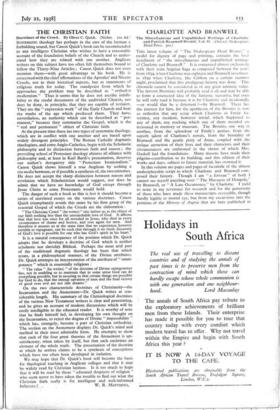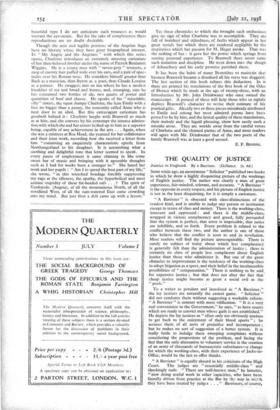CHARLOTTE AND BRANWELL
THIS latest volume of " The Shakespeare Head Bronte," a model for dignity of page and printing, contains the final instalment of " the miscellaneous and unpublished writings of Charlotte and Branwell." It is concerned almost exclusively with their joint Angrian Saga as composed between the years from 1834, when Charlotte was eighteen and Branwell seventeen. to 1839 when Charlotte, like Gibbon on a certain summer night, proclaimed that this prodigious history was done. This chronicle cannot be considered as of any great intrinsic value. The fervent Bronteite will probably read it all and may be able to form a connected idea of the fantastic narrative, but even he will only read it because it is by Charlotte and incidentally —or would that be a deterrent ?—by Branwell. There lies the interest for him, for the apotheosis of the Brontes is now so orthodox that any scrap which Charlotte or Emily ha; written, any incident, however trivial, which happened to any of them, any stocking which one of them mended are treasured in memory or museum. The Brontes, one way or another, from the splendour of Emily's genius, from the superb talent of Charlotte's novels, from the bestiality of Branwell and the gentle piety of Anne, coupled with the unique attraction of their lives and their characters and their circumstances are enthroned in the shrine of which Mrs. Gaskell laid the foundations. Many masons have made their pilgrim-contribution to its building, and this edition of their works and days, subject to future material, has crowned it.
In this volume are pages and pages of facsimile of the almost undecipherable script in which Charlotte and Branwell com- posed their history. Though I am " a fervent " of both I cannot see myself puzzling over " The Massacre of Dongola," by Branwell, or " A Late Occurrence," by Charlotte. I yield to none in my reverence for research and for the generosity of those who have made these manuscripts accessible, though hardly legible to mortal eye, but from my excursions into the portions of the History of Angria that are here published in
beautiful type I do not anticipate such treasures a; would warrant the eye-strain. But for the sake Of completeness these reproductions are no doubt desirable.
Though the new and legible portions of the Angrian Saga have no literary value, they have great biographical interest. In " My Angria and the Angrians " with which this series opens, Charlotte introduces an extremely amusing caricature of her then-beloved brother under the name of Patrick Benjamin Wiggins. He is a young man with " raven-grey " trousers, a mop of carroty hair puffed wide over his ears, and a pair of spec- tacks over his Roman nose. He considers himself greater than Bach as a musician, than Byron. as a poet, than Claude Loraine as a painter. He swaggers into an inn where he has a modest breakfast of tea and bread and butter, and, emerging, says he has consumed two bottles of ale, two quarts of porter and quantities of beef and cheese. He speaks of his " miserable, silly" sisters, the squat dumpy Charlotte, the lean Emily with a face no bigger than a penny, the nonentity called Anne who is next door to an idiot. But this extravagant caricature has goodwill behind it : Charlotte laughs with Branwell as much as at him, and she conveys by his contempt the intense admira- tion with which she and her sisters looked up to him as a superior being, capable of any achievement in the arts . . . Again, when she was a mistress at Roe Head, she yearned for her collaborator and their joint work, recording how she received a letter from him "containing an exquisitely characteristic epistle from Northangerland to his daughter. It is astonishing what a soothing and delightful tone that letter seemed to speak. In every pause of employment it came chiming in like some sweet bar of music and bringing with it agreeable thoughts such as I had for weeks been a stranger to." She hated her work and her pupils : " Am I to spend the best part of my life," she wrote, " in this wretched bondage forcibly suppressing my rage at the idleness, the apathy, the hyperbolical and most asinine stupidity of these fat-headed oafs . . . ? The spirit of Verdopolis (Angria), of all the mountainous North, of all the woodland West, of all the rain-watered East came crowding into my mind. But just then a dolt came up with a lesson." Yet these chronicles to which she brought such enthusiasm give no sign of what Charlotte was to accomplish. They are full of bombast and stiltedness, of. faults which appear in her great novels but which there are rendered negligible by the inspiration which her passion for M. Heger awoke. That was the making of her : it gave her the power which springs from searing persona? experience. To Branwell there never came such initiation and discipline. He went down into the slough of debauchery and his early promise perished there.
It has been the habit of many Bronteites to maintain that because Branwell became a drunkard all his verse was doggerel. The last section of this book refutes this deduction.. In it there are printed his translations of the first book of the Odes of Horace which he made at the age of twenty-three, with an Introduction by Mr. John Drinkwater who once owned the manuscript. A perusal of these will help those who so, rightly deplore Branwell's character to revise their estimate of his poetical gifts. Already two or three pieces mistakenly attributed to Emily and among her most admired poems have been provel to be by him, and the lyrical quality of these translations, their melody and the liquid phrasing, show how easily such a mistake arose. They are worlds away from the careful verses of Charlotte and the rhymed pieties of Anne, and most readers will agree with Mr. Drinkwater that of the two poets of the family Branwell was at least a good second.
E. F. BENSON.












































 Previous page
Previous page